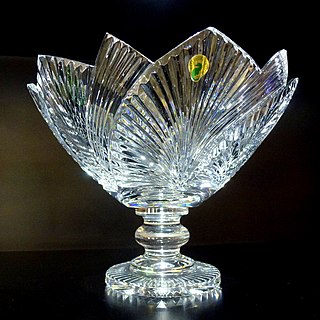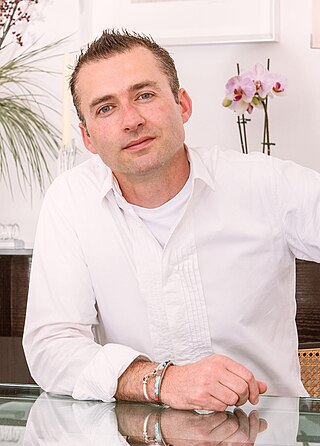

Tyrone Crystal was a crystal manufacturing company in Dungannon, County Tyrone in Northern Ireland.


Tyrone Crystal was a crystal manufacturing company in Dungannon, County Tyrone in Northern Ireland.
Glass-making and -decoration in County Tyrone can be dated back to the early medieval period, where Dunmisk outside Carrickmore was a centre for manufacture and provides the first evidence of glass work in Europe [1] Modern glass work dates to 1771, when Benjamin Edwards founded a company in County Tyrone, Ireland. Tyrone Crystal was set up two hundred years later in 1971, by Father Austin Eustace to create employment in the Dungannon area of County Tyrone. There was not a lot of employment in the area at the time, and nobody in the area knew anything about making crystal. An advertisement was placed in a national newspaper, seeking someone who could train people in the area. Two Austrians, a master blower and a master cutter, were hiking across England and read the advertisement; they came over to train the employees. Trainees began practising on glass jars and bottles until they became skilled enough to make crystal on their own, and they set up a glass-blowing shop in Dungannon.
In 1988 the company was awarded an ISO 9000 for quality; the youngest glasshouse in Ireland or the U.K. to gain the recognised standard. A new factory, built in 1990, is also a tourist attraction. Tyrone Crystal acquired Tipperary Crystal in 2000 as part of an investment plan that spent £500,000 on a new visitors' centre that opened in 2001. [2] The company was acquired by businessmen Peter Maginnis and Nigel Blackburn in 2006.
From 2005, Tyrone Crystal manufactured the trophy for the Canadian Grand Prix. [3]
Designer Marcus Notley was commissioned by Tyrone to design the chandelier for the Great Room in the Merchant Hotel in Belfast. It is made out of embellished gold on metal and 2600 blown out crystal pieces. With 4.5m in height, 2.9m in diameter and a weight of 400 kg, it is the largest chandelier in Ireland. [4] [5] The chandelier was installed in 2006.
The Dungannon factory closed on 12 March 2010, with the loss of 31 jobs. [6] [7] [8] [9]
![]() Media related to Tyrone Crystal at Wikimedia Commons
Media related to Tyrone Crystal at Wikimedia Commons

Cookstown is a town in County Tyrone, Northern Ireland. It is the fourth-largest town in the county and had a population of 12,546 in the 2021 census. It, along with Magherafelt and Dungannon, is one of the main towns in the Mid-Ulster council area. It was founded around 1620 when the townlands in the area were leased by an English ecclesiastical lawyer, Dr. Alan Cooke, from the Archbishop of Armagh, who had been granted the lands after the Flight of the Earls during the Plantation of Ulster. It was one of the main centres of the linen industry west of the River Bann, and until 1956 the flax-related processes of spinning, weaving, bleaching and beetling were carried out in the town.

Waterford Crystal is a manufacturer of lead glass or "crystal", especially in cut glass, named after the city of Waterford, Ireland. In January 2009, the main Waterford Crystal manufacturing base on the edge of Waterford was closed due to the insolvency of Waterford Wedgwood PLC, and in June 2010, Waterford Crystal relocated almost back to the roots of glass-making in the city centre. The Mall location holds both a manufacturing facility that melts over 750 tonnes of crystal a year – although most Waterford Crystal is now produced outside Ireland – and a visitor centre with the world's largest collection of Waterford Crystal. As of 2015, the brand is owned by the Fiskars Corporation.

Dungannon is a town in County Tyrone, Northern Ireland. It is the second-largest town in the county and had a population of 16,282 at the 2021 Census. The Dungannon and South Tyrone Borough Council had its headquarters in the town, though since 2015 the area has been covered by Mid-Ulster District Council.

Dartington Crystal is a British manufacturer of crystal glassware and it's based in the town of Torrington in North Devon, England. The company manufactures their glassware using traditional glass blowing techniques.

The Ulster Transport Authority (UTA) ran rail and bus transport in Northern Ireland that operated from 1948 until 1967.

Carrickmore is a small town in County Tyrone, Northern Ireland. It is situated in the historic barony of Omagh East, the civil parish of Termonmaguirk and the Roman Catholic Parish of Termonmaguirc between Cookstown, Dungannon and Omagh. It had a population of 612 in the 2001 Census. In the 2011 Census 2,330 people lived in the Termon Ward, which covers the Carrickmore and Creggan areas.

Castlecaulfield is a village in the south-east of County Tyrone in Northern Ireland. It lies about 2 miles west of Dungannon and is part of the Mid Ulster District Council area. The village is mostly within the townland of Drumreany, although part of it extends into Lisnamonaghan. It is situated in the historic Barony of Dungannon Middle and the civil parish of Donaghmore.

Pomeroy is a small village and civil parish in County Tyrone, Northern Ireland. It is in the townland of Cavanakeeran, about 8.5 miles (14 km) from Cookstown, 9 miles (14 km) from Dungannon and 16 miles (26 km) from Omagh. The 2011 Census recorded a population of 788 people.

Stangmore Park is a football stadium in Dungannon, County Tyrone, Northern Ireland. It is the home ground of Dungannon Swifts, and holds around 2,000 spectators, 300 of whom can be seated.

Maurice George Morrow, Baron Morrow is a Unionist politician from Northern Ireland representing the Democratic Unionist Party (DUP) who has been Chairman of the DUP since 2000. He was made a life peer in June 2006. He was also a councillor on Dungannon and South Tyrone Borough Council representing Dungannon Town.

Edinburgh Crystal was a cut glass manufactured in Scotland from c. 1820s to 2006, and was also the name of the manufacturing company. In addition to drinking glasses, Edinburgh Crystal made decanters, bowls, baskets, and bells, in several ranges.
Caithness Glass is a Scottish artistic glassware manufacturing company. It was established in Wick, Caithness, Scotland in 1961 by Robin Sinclair, 2nd Viscount Thurso. It was rescued by George Mackie, Baron Mackie of Benshie in 1966. Mackie was chairman for the next two decades. Since 2006, the company has been based in Crieff, Perthshire. The company was created to help create additional employment in the face of continuing decline in local fishing and agriculture and also to take advantage of the easy availability of sand for glassmaking in Caithness. The local sand, however, proved unsuitable for manufacturing clear glass. The company soon specialised in the manufacture of glass paperweights, plus some ornamental glassware. The firm also became well known for supplying the annual trophy for the BBC Mastermind television quiz programme. The company was awarded a Royal Warrant by the Queen Mother in 1968.
The Mid-Ulster Cup is a senior football competition in Northern Ireland run by the Mid-Ulster Football Association. The competition has historically featured teams based in County Armagh, east County Tyrone, and west County Down, though teams from outside the Mid-Ulster FA's jurisdiction have also competed on occasion, with Bangor winning the cup in 1995/96.
Preciosa is the luxury brand name for the range of precision-cut lead crystal glass and related products produced by Preciosa a.s. of Jablonec nad Nisou, Czech Republic.

The Merchant Hotel is a five-star luxury hotel in Belfast, Northern Ireland. The hotel is situated on Skipper Street.
This is a chronology of activities by the Provisional Irish Republican Army (IRA), from 1992 to 1999.

Omagh railway station was a railway station that served Omagh in County Tyrone in Northern Ireland.

Marcus Notley is an Irish product designer specializing in designing consumer products for the home. He designed Ireland's largest crystal chandelier for the Merchant Hotel in Belfast.
Seneca Glass Company was a glass manufacturer that began in Fostoria, Ohio, in 1891. At one time it was the largest manufacturer of blown tumblers in the United States. The company was also known for its high-quality lead (crystal) stemware, which was hand-made for nearly a century. Customers included Eleanor Roosevelt and Lyndon B. Johnson, and retailers such as Marshall Field and Company, Neiman Marcus, and Tiffany's.
This is a chronology of activities by the Provisional Irish Republican Army (IRA), in 1990 and 1991.